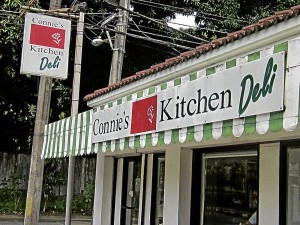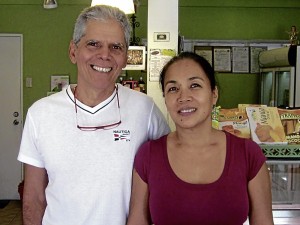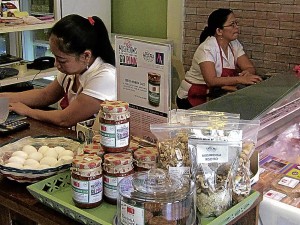Pinoy comfort food attains gourmet status
 You can see their bottled food products in the major supermarkets like Rustan’s, Robinsons, Shopwise, Landmark, and one kiosk in the fourth level of SM Megamall: Connie’s Kitchen gourmet fish (bacalao, daing and tuyo) and pasta sauce like Salsa Amaya and the risqué-sounding puttanesca.
You can see their bottled food products in the major supermarkets like Rustan’s, Robinsons, Shopwise, Landmark, and one kiosk in the fourth level of SM Megamall: Connie’s Kitchen gourmet fish (bacalao, daing and tuyo) and pasta sauce like Salsa Amaya and the risqué-sounding puttanesca.
The products are also found in some supermarkets in Cebu and Cagayan de Oro City, and cost a bit more than the ubiquitous Spanish sardines in bottles.
These boneless fish and pasta sauce are garnished with succulent ingredients like extra virgin olive oil, mushrooms, crushed tomatoes, soya oil, garlic, vinegar, pimientos, paprika and spices.
The Spanish-style bacalao (salted dried Surgeon fish) tastes just like the way my mother prepared it for us during Lent, especially on Ash Wednesday and Good Friday, when one could not eat meat without committing a sin (mortal or venial, take your pick).
Other bestsellers are the daing, dulong and tuyo, which are breakfast staples in any Pinoy home, urban or rural.
Connie’s Kitchen is owned by entrepreneurs Manolet and Connie Gonzalez, who also maintain a Deli (tel. 721-5691) in New Manila, Quezon City, across the Our Lady of Mount Carmel Church.
Article continues after this advertisement“We were the first to call ourselves gourmet,” says Manolet, with no hint of being boastful. “The way we prepare simple Filipino comfort food has elevated this to gourmet status. There are no bones, scales, etc. and we put in olive oil to give it a gourmet flavor.”
Article continues after this advertisement“We’ve been imitated,” adds Connie succinctly, but declines to elaborate.
The venture started some 18 years ago with baon (picnic food) for camping trips to Lake Caliraya, Laguna and other places, the Gonzalezes being an outdoor family. The daing was the first to be prepared. Then balikbayan (returning Pinoys) friends, home for the Christmas bazaars, started to order from them, so they could bring it to relatives abroad who were longing for good Filipino food.
“We were surprised at how well it was received,” recalls Connie. “Then word spread and in 1994 we registered the business so we could market it properly.”
And so the business grew through the years, and the bottled products (now numbering 18) became more visible in the supermarkets. It spread mostly through word of mouth, satisfied customers, and exposure through the bazaars and trade fairs. It is only now that Connie’s Kitchen will have a website, courtesy of a son who is—as the couple laughingly admit—more computer-savvy than his parents.
Everything is locally made, like the dried fish (“no preservatives, all natural”). The pasta is home-made, and the mushrooms come from local growers. “The main concept is to showcase locally made gourmet foods and encourage their growth,” says Manolet.
For the month of October there is a tieup with the Cancer Foundation, in which proceeds from a special sauce prepared at the Deli will go to them. Other establishments are also participating in this endeavor.
It has been 18 years now. So how’s business?
“It has put food on the table,” Manolet says modestly. “It’s something we hope our children can build on and expand.”
photos by Amadís Ma. Guerrero Contributor

